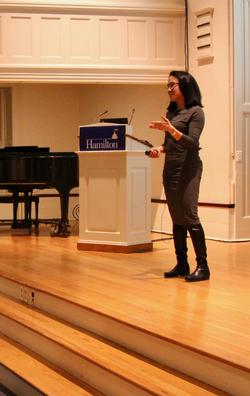News
Psychology rock-star Angela Duckworth speaks at Hamilton about grit
By Gabriela Foster ’18
February 23, 2017
Tags news
Addressing a packed chapel this past Tuesday, Feb. 21, Professor of Psychology from the University of Pennsylvania, Angela Duckworth discussed her New York Times bestselling book, Grit: Passion, Perseverance, and the Science of Success. After conducting extensive research on high achieving individuals such as West Point Cadets, National Spelling Bee champions and Olympic swimmers, Duckworth revealed that the key to success is simply grittiness, or the ability to maintain a certain level of passion and perseverance for long-term goals.
A cornerstone of Duckworth’s research was the formation of the “Grit Scale.” At the beginning of the lecture, Duckworth discussed how this test predicted which freshman cadets would make it through West Point’s mentally and physically challenging basic training, commonly referred to as “Beast Barracks” for its grueling nature. Questions on the grit test focused on topics regarding perseverance in the face of adversity, follow through, degree of diligence and length of sustained interests. The test turned out to be highly effective in predicting the dropout rate of cadets, with grit being the “x factor.”
When asked about her response to the MacArthur Genius Fellow’s argument about the power of passion and perseverance, Catherine Silvestri ’19 stated, “Dr. Duckworth is an exemplification of the grittiness she is so passionate about understanding. She is a dynamic public speaker with an impressive body of work to back up her engaging assertions. Her lecture inspired me to reflect on my own goals and work ethic, including ways in which I can implement changes and improve my own grittiness.”
Duckworth explained that being successful depends on a lot of talent and skill, but that effort is the determining factor in measuring grittiness. To become a grittier individual and lead a more successful life, Duckworth suggested the “10,000 hour rule”. Duckworth took this idea one step further, emphasizing importance of deliberate practice in achieving excellence. Her research on deliberate practice focused on individuals competing in the National Spelling Bee. The 10,000 rule, often associated with psychology writer Malcolm Gladwell, holds that to become the best at something, in this case spelling, one must complete 10,000 hours of mindful practicing. Duckworth proceeded to divide deliberate practice into four simple steps: set a stretch goal, focus 100% on that goal, get feedback and reflect and refine your methods.
In closing, Duckworth left the audience with four recommendations on how to become grittier individuals. In response to the talk, Eleni Neyland ’18 stated, ““Dr. Duckworth is incredibly impressive as a scientist and public speaker, so her talk was great. But aside from being entertaining, it was also informative: each person in the audience regardless of age, interest area, or current level of “grit,” left with a to-do list on how to be a better person.”
Duckworth’s first piece of advice encouraged the audience to develop their interests before training their weaknesses. In other words: “learn to trade nuance for novelty.” Duckworth described how her work in the field of psychology is not “new” to her, but her deeper understanding of the topic has allowed her to appreciate the various subtleties in her work. Her second piece of advice focused on: “know the science of deliberate practice.” Her research illustrated the positive academic performances of children who understand how deliberate studying works, giving hope to the idea that grit can be a learned trait.
Duckworth’s third recommendation focused on cultivating purpose. She stated that one must take into account whether their goals are rewarding and whether their goals give them purpose (a factor that has a strong correlation with grit). Her last recommendation centered on the maxim: “change your mind about changing your mind.” She stated that grit is achieved by altering our preconceived ideas about intelligence. Instead of viewing intelligence as fixed, we should view it as something that can grow. In espousing a desire to learn, a tendency to learn will be cultivated, leading to success rather than stagnation.





